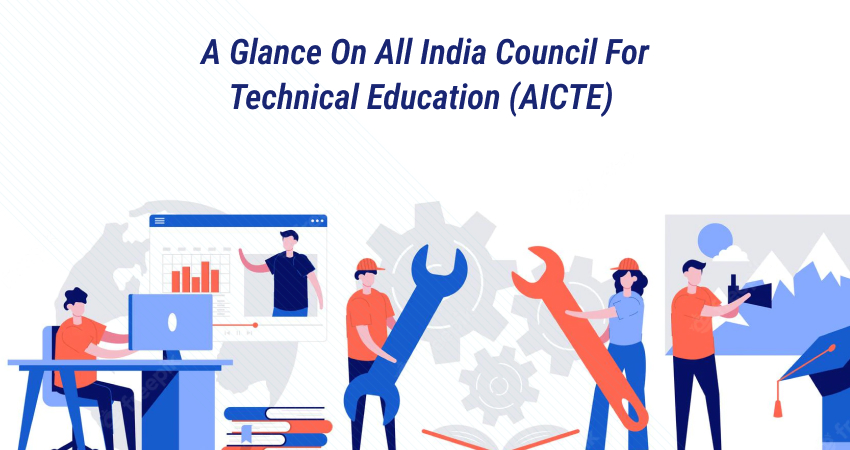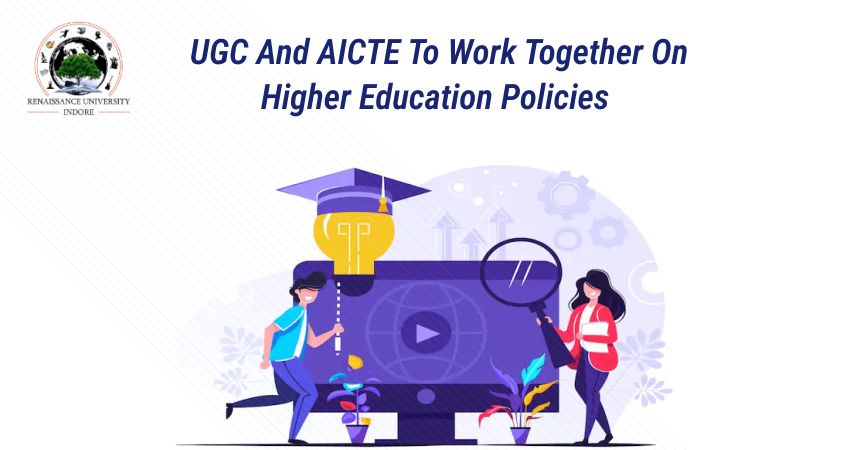A new committee, the Higher Education Commission of India (HECI), has been set up to provide unique educational opportunities to Indian kids. The committee will be regulated by the All India Council of Technical Education (AICTE) and the University Grants Commission (UGC). They will work in collaboration with one other as regulatory bodies for HECI.
The group, established by UGC chairperson Prof. M. Jagadesh Kumar, will initially pinpoint areas where the two authorities might collaborate on developing rules and regulations using a uniform methodology.
The change occurs as the administration prepares to propose the HECI Bill during the winter session of Parliament.
According to Prof. Kumar, bringing together two distinct committees will assist the newly-formed Higher Education Commission of India in providing the proposed benefits in the learning system. The new organization will also deal with the several regulations that stop students from going for general or technical degrees or courses.
The committee includes prime people like the Vice-Chairpersons of UGC and AICTE, in addition to the UGC secretary and AICTE member-secretary.
Kumar also stated that the committee would also work on identifying other areas where the two commissions can work together on common grounds for the good of students. The areas identified by this new committee will be allotted to a different sub-committee, which will include two different regulators. They will be required to work on their concerned areas. This would reflect the idea that HCEI is being built to oversee every aspect of higher education and ensure the problems are solved in time.
Professor Kumar is in charge of AICTE, who took over Professor Anil Sahasrabudhe, who recently retired and was the first chief of the National Educational Technology Forum (NETF). The new collaboration will also overview and offer recent technological advancements in education.
When it comes to performing necessary regulations on the National Education Policy Act of 2020, HCEI plays an extremely vital role. The plan to merge the two regulatory committees was proposed before the Act’s launch in 2020. However, things were not finalized.
With the initiation of NEP, the government was given yet another chance to bring the two organizations together. The now-lapsed bill, Higher Education Council of India, was also created for the same purpose back in 2018.
A Glimpse On University Grants Commission (UGC)
Our nation, India, has always had a fantastic higher education system, from antiquity to the current era. The post-independence era had a higher level of system growth.
The earliest universities in the world, including Takshashila, Nalanda, and Vikramashila, were located in ancient India. Without a doubt, India served as a hub for learning for both its citizens and those from other republics.
Perhaps many of us are unaware that India has developed so amazingly that we now have the pleasure of studying in the third-largest education system in the world. The UGC, the primary regulating organization for tertiary education, is in charge of the system.
What is UGC?

To start with, UGC stands for University Grants Commission.
The History
Our current understanding of UGC is the consequence of several complex efforts that were made both before and after Indian Independence. Come, let’s take part in the University Grants Commission’s establishing adventure.
- The Sargent Report, published in 1944, was the first effort to establish a system of education. It was the Central Advisory Board of Education’s Report on the Post-War Development of Indian Education.
- As a result of the recommendation, the University Grants Committee was established in 1945 and given control over Aligarh, Banaras, and Delhi’s three Central Universities.
- The committee was given the duty of overseeing all of that era’s universities in 1947.
- Dr. Sarvepalli Radhakrishnan was the head of the University Education Commission, which was established in 1948. The report recommended changing the current University Grants Committee into a University Grants Commission India, similar to the UK.
- The University Grants Commission was established by Maulana Abul Kalam Azad, a former minister of education, on December 28, 1953.
- And via the passage of the “University Grants Commission Act, 1956” by the Parliament, the UGC (University Grants Commission) was legally constituted as a statutory entity of the Government of India in November 1956. The goal was to oversee the establishment, determination, and upkeep of university education standards in our nation.
- After six centers were established by UGC in 1994 and 1995 in Pune, Hyderabad, Kolkata, Bhopal, Guwahati, and Bangalore to oversee the region-specific Indian educational system. The head office is now located in New Delhi at Bahadur Shah Zafar Marg.
Roles and Responsibilities
The primary goal and function of the UGC in higher education are to support UGC-approved universities and to coordinate, establish, and uphold the ethical standards in these institutions. The commission supports the consensus among the academic community, the state and local governments, and the public.
For institutions to be UGC Approved Universities, UGC has established additional requirements. Numerous prestigious, medium-sized, and small institutions are being founded daily in India as a result of the expansion of higher education. There are several of these universities that are bogus and do not meet the UGC requirements.
To aid students in identifying these disqualified universities, the University Grants Commission has published a list of Fake Universities in India.
Here are some of the significant responsibilities performed by UGC:
- Encourage and plan for higher study.
- Set guidelines for the minimal educational requirements.
- Creating criteria for tests like the ICAR NET, UGC NET, and CSIR UGC NET
- Examine the expansion of the sphere of higher education.
- Grants for colleges and universities are welcome.
- Keep the lines of communication open between higher education institutions and the federal and state governments.
- Introduce mandatory regulations to the federal and state governments as a way to improve university education.
Scholarships
The commission has prepared several UGC fellowships and scholarships that give students who are consistently improving our educational system tremendous opportunities.
Students who are struggling financially but have the potential to make significant changes in the higher education system can continue their studies without worry, thanks to UGC scholarships.
A Glance On All India Council For Technical Education (AICTE)

The planning and development of India’s management education and technical education systems are the responsibility of the All India Council for Technical Education (AICTE), a governmental agency. The Department of Higher Education oversees the council’s national operations.
AICTE was first founded as a consultative organization in 1945 to evaluate the country’s technical education infrastructure and advance national development. The National Policy of Education (1986) then granted AICTE formal status in 1987.
Roles and Responsibilities
- The All India Council for Technical Education is in charge of overseeing the institutions of technical education and fostering the growth of the nation.
- The Human Resources and Development Ministry (HRD) of the Government of India established the National Working Group to oversee AICTE’s involvement in growing the number of technical schools and maintaining the necessary standards in the same. The Working Group claims that AICTE has the legal power required to improve its operations. To accomplish the necessary goals, the AICTE is invested in a variety of tasks and responsibilities.
- The statutory authority in charge of developing and upholding the rules and standards is the AICTE.
- By assessing an institution’s operations and services to make sure they adhere to the necessary standards, it also handles the process of quality assurance through the certification of schools.
- The AICTE keeps track of, assesses, and funds the functional areas in accordance with priority.
- It upholds the equality of recognition and certification.
- The country’s technical education must be managed through coordinated efforts.
- It deals with technical education programs that involve research and instruction in a variety of fields, including management, architecture, town planning, applied arts and crafts, catering technology, hotel management, pharmacy, and others.
Sub-Bodies
The organizational structure of the AICTE consists of many bureaus. In each of these bureaus, the advisor acts as the head. The technical officers and bureau head’s support personnel help. These employees work for the University Grants Commission, academic institutions, or government agencies on deputation or under contract.
The Approvals Bureau: The approval bureau handles the approval procedures when a new technical institution or integrated campus is founded.
Policy Planning and Academic Planning: This body is coordinated and integrated by the AICTE’s Research and Coordination department for technical education.
The Administration Bureau: For efficient administration, the bureau nominates its members to serve on various committees and provides training for the AICTE employees.
The Finance Bureau: It controls the organization’s cash and bills as well as the withdrawal and disbursement of funds.
Initiatives
The AICTE has implemented several initiatives and programs to support technical education as well as the growth of teachers and students. Here are a handful of those examples:
1. Student Learning Assessment Project – AICTE
The study evaluates students’ academic and aptitude progress in technical programs. Understanding and identifying the elements that interfere with students’ skill development is also helpful.
2. The Jal Shakti Abhiyan
As a response to the water crisis in areas of the nation where there is a shortage of water, the government established the “JalShakti Abhiyan” initiative, which is intended to accelerate water conservation efforts. In order to enable student involvement in Jal Shakti Abhiyan, approximately 40000 engineering students have been mapped to the district government thanks to the efforts of AICTE. To promote their efforts, the AICTE also gave prizes to the institutions with the greatest performance.
3. One Student, One Tree
The goal of the “One Student, One Tree” program is to support a clean, green environment. Each student planted a tree as part of an effort by all AICTE-approved technical colleges to instill social responsibility in their pupils. AICTE also acknowledged the institutions with the best performance.
4. AICTE-SWANATH Scholarship Scheme
The AICTE-approved SWANATH SCHOLARSHIP SCHEME offers pupils from selected disadvantaged groups financial aid of Rs. 50,000 every academic year.
5. STTP-SFURTI AICTE
The STTP-SFURTI program seeks to provide teacher and student training through financial support from AICTE to aid in technical education. It aims to put into practice a variety of strategies to aid academic staff and students in the growth of the country’s small business.



